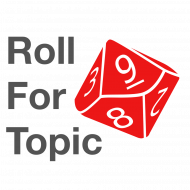In each episode of the Roll for Topic podcast, we randomly determine a topic of conversation by rolling a d10 and consulting the table below. Once we’ve discussed a topic, it’s removed from the table and replaced by a new topic.
Roll d10 and consult the table below:
- How do you handle lore dumps?
- Are there sections of RPG rulebooks that you always find yourself ignoring or changing?
- How to convey the world as envisioned by the GM to the players?
- How do you keep “off-screen” NPCs/Factions organized?
- open
- How do snacks work at your table?
- When do you invite players to help you build the world?
- open
- open
- open
Topic we’ve already covered
Here are the topics we’ve discussed so far:
- Who is in your personal Mt. Rushmore of RPG Creatives?
- How do you spotlight characters?
- If you could pick anyone from the past or present to play a TTRPG with who would you pick?
- How do you help players to roleplay together, rather than just with you?
- What does a great “flawed hero” look like as a PC?
- How do you steal from movies and books?
- What goes into running a great online/VTT game, particularly if you’re used to in-person games?
- How do you keep your session notes and campaign info organized (if you do) over the long term?
- How do you incorporate the families and loved ones of PCs into your games?
- Do you require your players to read the rules?
- How do you deal with “shiny object syndrome” as a GM?
- How do you increase player investment in the story?
- How do you balance levity, action, and drama in your games?
- How do you design puzzles?
- How do you store and care for your game books? How do you use them at the game table?
- What campaign are you chickening out of running?
- How do you handle mazes in your games?
- How do you use PDFs and digital game resources?
- How do you handle luck, second chances, or supernatural intervention in your games?
- How do you handle inventory and inventory management?
- How do you prepare set-piece encounters?
- Do you prefer creating your own setting or using an existing setting, and why?
- Do you share the plot points and secrets your players missed with your players?
- How do you create memorable NPCs?
- What do you do when you’re just not feeling motivated to run a game?
- How do you use fear at the table?
- How do you handle character death?
- How do you make dungeons more adventurous?
- How do make in-game travel interesting?
- How do you run games when your group is just one or two players? (Shel Kahn)
- How do you handle romance and shopping in your games?
- When do you look up rules?
- How do you bring a new game to your existing gaming group? (added by Murph in episode 15). Rolled 8.
- How do you deal with anxiety as a gamemaster?
- Do you read the block text in your adventure? Either the written text, or your own prewritten text?
- How do you introduce a non-gamer to your game?
- How do you handle doors in dungeons? (added by Jessica Snyder in episode 6)
- How do you give a player who is leaving a game a satisfying send-off?
- How do you use history to inform your quest and gaming?
- How to run a game in two hours or less (episode 1). Rolled 9.
- How to handle it when game sessions get derailed (episode 2). Rolled 10.
- How to use a dungeon master’s screen (episode 3). Rolled 6.
- Props/handouts and when to use them (epsiode 4). Rolled 5.
- Bringing elements from other game systems into your game (episode 5.) Rolled 2.
- Techniques to keep combat moving (episode 7). Rolled 1.
- How do you deal with severe consequences to player actions (episode 8). Rolled 1.
- How do you determine the “power level” of your game? Are your players normal people or demi-gods? How do you handle player disagreements about this? (added by Mark French in episode 5). Rolled 2.
- How do you draw a player back in when they’re bored or distracted? (episode 10). Rolled 4.
- How do you manage hit points and other fiddly details during combat? (episode 11). Rolled 8.
- How do you use and introduce randomness into your games? (episode 12). Rolled 4.
- How much (and what kind of) preparation do you do before running a game? (episode 13). Rolled 1.
- How do you handle monsters in a game? (episode 14). Rolled 1.
- Theater-of-the-mind vs. maps, minis, and other visual representations: what the pros and cons of each? (added by Jason Matteson in episode 11). Rolled 8
- What elements from other media (books, movies, video games, etc.) do you bring into your tabletop RPGs? (episode 21)
